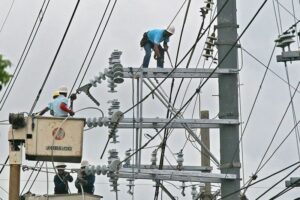T-bill yields inch up on dovish Fed bets

THE GOVERNMENT made a full award of the Treasury bills (T-bills) it offered on Monday even as rates rose across all tenors after stronger-than-expected US jobs data dampened expectations of an early cut by the US Federal Reserve.
The Bureau of the Treasury (BTr) raised P25 billion as planned from the T-bills it auctioned off on Monday as total bids reached P74.225 billion, almost thrice the amount on offer but lower than the P80.265 billion in tenders recorded on April 28.
Broken down, the Treasury borrowed the programmed P8 billion via the 91-day T-bills on Monday as tenders for the tenor reached P23.48 billion. The three-month paper was quoted at an average rate of 5.573%, 2.7 basis points (bps) higher than the 5.546% seen in the previous auction. Tenders accepted by the BTr carried yields of 5.5% to 5.596%.
The government likewise made a full P8-billion award of the 182-day securities as bids amounted to P27.835 billion. The average rate of the six-month T-bill was at 5.667%, 1.2 basis points (bps) higher than the 5.655% fetched last week, with accepted rates ranging from 5.644% to 5.678%.
Lastly, the Treasury raised P9 billion as planned via the 364-day debt papers as demand for the tenor totaled P22.91 billion. The average rate of the one-year T-bill inched up by 0.9 bp to 5.697% from 5.688% previously, with bids accepted having yields of 5.68% to 5.718%.
At the secondary market before Monday’s auction, the 91-, 182-, and 364-day T-bills were quoted at 5.5146%, 5.6713%, and 5.7183%, respectively, based on PHP Bloomberg Valuation Service (BVAL) Reference Rates data provided by the Treasury.
The BTr said it made a full award of the T-bills as the offer went oversubscribed.
“Demand was within expectations because the market is cautious due to uncertainties regarding the US tariffs,” a trader said in a phone interview. “But the US is dialing back, possibly reaching an agreement with China.”
The trader added that T-bill rates rose due to the better-than-expected US nonfarm payrolls data released on Friday, which means there is less pressure on the Fed to cut rates despite the US economy’s contraction in the first quarter.
Federal Reserve policymakers on the alert for possible cracks in the labor market as businesses adjust to President Donald J. Trump’s erratic trade policy got some reassurance on Friday that so far there’s little weakness, and no reason to rush on rate cuts, Reuters reported.
US employers added a more-than-expected 177,000 jobs in April, the Labor department reported, and the unemployment rate was unchanged at 4.2%. Both are signs the labor market remains in balance during a month when Trump announced the steepest tariffs in a century, sending stocks downward and convulsing the bond market before the administration paused many of those levies until July.
With the job market holding up and inflation still running above their 2% target, Fed policymakers are expected to stick to their plan to leave short-term borrowing costs where they are while they wait to see how the tariffs affect prices and economic growth. Hourly earnings rose 3.8% from a year earlier, the jobs report showed, the same pace as in March and in the range of what the Fed considers to be consistent with its 2% inflation target.
Traders are now betting the Fed will wait until July to start cutting interest rates; earlier they had thought a June move was more likely. And they now see the Fed delivering a total of three quarter-point interest rate cuts by year-end, one fewer than previously.
Shortly after the report, Mr. Trump reiterated his own call for the Fed to lower rates.
Fed policymakers, who say it will be the economy’s needs not the president’s desires that will dictate their moves, want to be sure that inflation won’t resurge. With the tariffs expected to drive prices higher, at least temporarily, they have signaled they’ll keep the policy rate in the current 4.25%-4.5% range to keep downward pressure on inflation, as long as the job market doesn’t crumble.
Meanwhile, Rizal Commercial Banking Corp. Chief Economist Michael L. Ricafort said in a Viber message said that T-bill rates rose to track the increase in comparable secondary market yields after the BTr’s P300-billion issuance of new 10-year fixed-rate Treasury note late last month that siphoned off some liquidity from the financial system.
On Tuesday, the government will offer P30 billion in reissued 10-year Treasury bonds (T-bonds) with a remaining life of seven years and four months.
The Treasury is looking to raise P260 billion from the domestic market this month, or P100 billion via T-bills and P160 billion through T-bonds.
The government borrows from local and foreign sources to help fund its budget deficit, which is capped at P1.54 trillion or 5.3% of gross domestic product this year. — Aaron Michael C. Sy with Reuters




